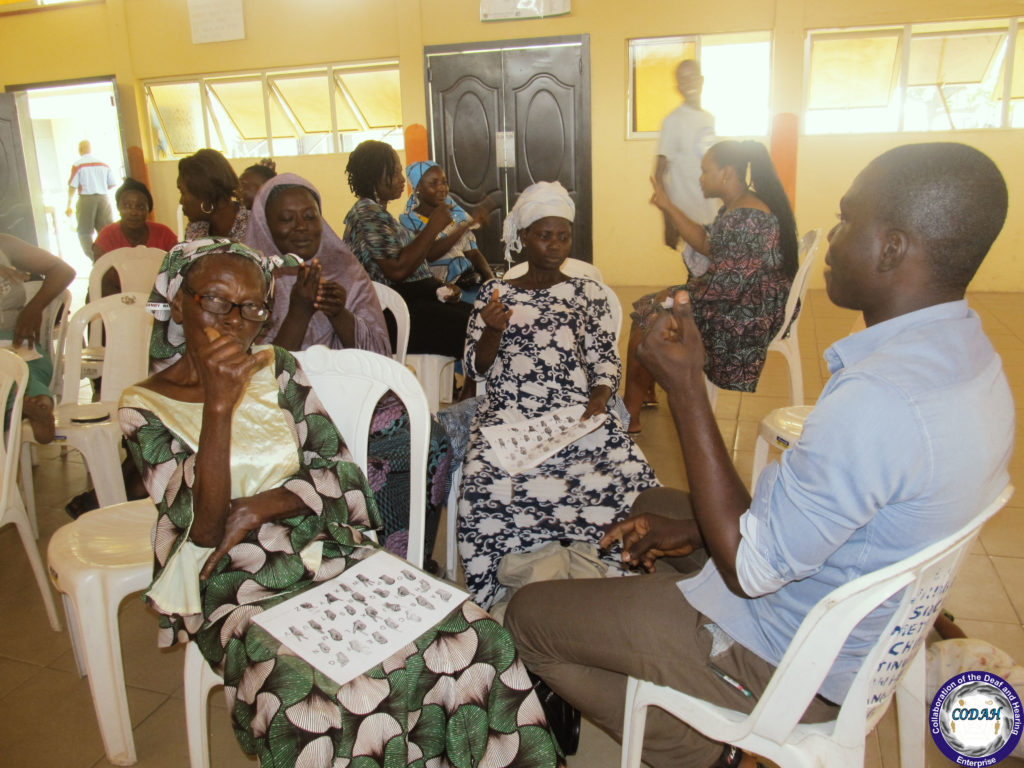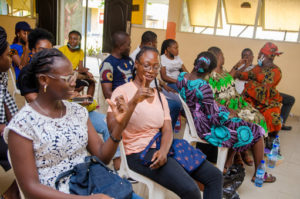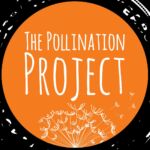“The world was created with so much diversity; that is its beauty. If we were all the same, it would be boring… colorless. What makes it colorful is the different people we meet.” – Rebecca
Olatunji Ayodele Rebecca, founder of the I Can Sign project in Nigeria, was born to deaf parents, and her sister is also deaf. Their communication in sign language routinely induced stares and impertinent questions from the outside world. During Rebecca’s teenage years, she withdrew and avoided signing with them until her sister confronted her to ask why she was ashamed of them. The exchange ignited a tearful awakening that would redirect her life toward a path of service.
“I made up my mind that day to change, but it was a journey,” Rebecca said. And, with the incessant stares and questioning, a challenging one at that. Many hearing individuals’ ignorance and lack of exposure to the deaf community’s distinguished communication and accessibility needs signifies ‘otherness’ and perpetuates marginalization.(1) “It took a long time to be comfortable,” she said, “I didn’t want to talk about my family.”

The change Rebecca committed to was further accelerated while volunteering for a nonprofit program. Enthusiastic inquiries from fellow activists regarding her remarkable story revealed the untapped potential of her skills. “This is my origins; I didn’t just pick this up and learn. Sign language is my first language,” she said. The trip marked a turning point in her destiny—the realization that she could do more by serving as an educator and advocate for the deaf community.
Rebecca was emphatic that a deaf person born to deaf parents like her sister is a rare privilege, with communication not being a barrier. Over 90% of deaf children are born to hearing parents.(2) She noted that in her country—poverty, inaccessibility to quality training and resources, and long work hours to support the family—often result in linguistic neglect for children with special needs. Families wait until the deaf child is old enough to attend school to learn the language. But, language deprivation can permanently alter the brain and cause cognitive delays and lifelong mental health challenges.(3) Starting school with the need for language acquisition also delays primary education, which is why Rebecca emphasizes the importance of introducing sign language as early as possible.
Not being able to communicate with their families leaves deaf children isolated and misunderstood. During a visit to her sister’s school, Rebecca observed many students resisting going home by running away or crying profusely. Deaf children are far more susceptible to maltreatment than hearing youth, with studies indicating a 25 percent higher rate of neglect and physical and sexual abuse.(4) In fact, a particular student’s distress was because of the sexual abuse she was enduring by an uncle, not being able to communicate this to her mother. And for such stories, Rebecca launched the I Can Sign project to reduce the neglect and abuse of deaf children by training parents to communicate in sign language and to create a better quality of life for deaf human beings.
 In 2020, Rebecca received her first micro-grant enabling the I Can Sign to train twenty-five parents. The pandemic forced them to move online, but the digital exposure fortuitously led her to The Pollination Project. The trust and lack of red tape for applicants and grant recipients seemed too good to be true. “As a changemaker, the road gets lonely. The Pollination Project gave me hope to aim for the stars and go global,” Rebecca said. “It was just the dream of one girl in Africa; I didn’t think it would happen. I’m so grateful that an international organization believed in what we are doing here in Nigeria.”
In 2020, Rebecca received her first micro-grant enabling the I Can Sign to train twenty-five parents. The pandemic forced them to move online, but the digital exposure fortuitously led her to The Pollination Project. The trust and lack of red tape for applicants and grant recipients seemed too good to be true. “As a changemaker, the road gets lonely. The Pollination Project gave me hope to aim for the stars and go global,” Rebecca said. “It was just the dream of one girl in Africa; I didn’t think it would happen. I’m so grateful that an international organization believed in what we are doing here in Nigeria.”
After receiving the grant, her team quickly pushed their plans into motion, alerting parents on the waiting list that they were ready for them. The training is a minimum of four weeks to learn the basics with extended online support. Rebecca’s dream is to train at least 500 parents by 2025 because that would mean “more deaf children are happier at home, can communicate with their parents, and access quality education,” she said. Another aspect of the project is to teach hearing children sign language for exposure to diverse communities and to reduce stigmas. She aims to train 5,000 children by 2025. More people that can sign means more opportunities and accessibility for deaf people. “We are trying to make a better society for the deaf community,” she said.
While shame may have haunted Rebecca’s earlier years, her story is now a message of pride. “It’s something I completely tell the world,” she said. “It’s what people know me for now.” She encourages others to be open-minded and curious about surrounding diversity because then we can enjoy the world’s ‘hidden beauty.’
References
- Victoria L Mousley, Stephenie R Chaudoir, Deaf Stigma: Links Between Stigma and Well-Being Among Deaf Emerging Adults, The Journal of Deaf Studies and Deaf Education, Volume 23, Issue 4, October 2018, Pages 341–350, https://doi.org/10.1093/deafed/eny018
- Quick Statistics About Hearing. (2021, March 25). NIDCD. https://www.nidcd.nih.gov/health/statistics/quick-statistics-hearing
- Hall WC. What You Don’t Know Can Hurt You: The Risk of Language Deprivation by Impairing Sign Language Development in Deaf Children. Matern Child Health J. 2017 May;21(5):961-965. doi: 10.1007/s10995-017-2287-y. PMID: 28185206; PMCID: PMC5392137.
- Rochester Institute of Technology. (2011, February 7). Abuse rates higher among deaf and hard-of-hearing children compared with hearing youths, study finds. ScienceDaily. Retrieved December 20, 2022 from www.sciencedaily.com/releases/2011/01/110118154733.htm


